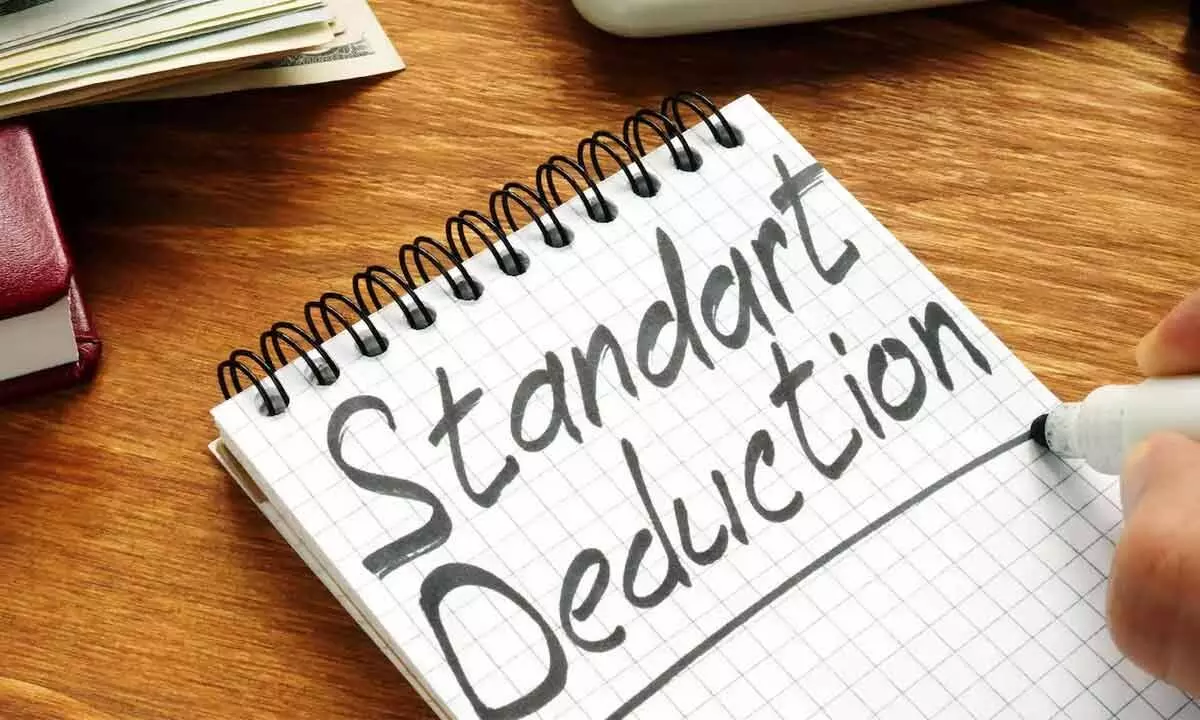Standard deduction introduced in new tax regime, whom will it benefit?
The salaried taxpayers with the income that is charged under salaries should allow a deduction of Rs 50,000 or the salary amount, whichever is lesser for the computation of the taxable income
image for illustrative purpose

Standard deduction is a concept that was first introduced in 1974 under Section 16 of the Income Tax Act 1961. The standard deduction is a fixed amount subtracted from the salary income of individuals before the calculation of taxable income. Conceptually, the standard deduction was introduced to compensate salaried people for the fact that small business people, self-employed and entrepreneurs pay tax only on their net income after deducting business expenditure. Hence, the standard deduction is supposed to take care of the expenses of salaried individuals, which are not allowed as deductions under income tax rules. Therefore, there is no requirement to submit documents or proof for claiming the standard deduction. However, the standard deduction was abolished with effect from Financial Year 2005-06 after overhauling tax slabs and lifting the exemption limit to Rs one lakh. This deduction was available till FY05. For FY 2004-05, the amount of deduction allowed was equivalent to Rs 30,000 or 40 per cent of the income, whichever is lower for those earning in the bracket of Rs 75,000 and Rs five lakhs. The standard deduction limit was fixed at Rs 20,000 for those earning above Rs five lakhs.
Under Section 16 (ia) of the Income Tax Act 1961, the standard deduction only applies to salaried individuals, including salaried professionals. The standard deduction under Section 16 (ia) is also applicable for retired individuals having a pension income. As the pension is taxable under the head - "Income from salary", the standard deduction of such pension income is allowable every financial year. However, pension income like an annuity from life insurance or under NPS (National Pension Scheme) are not eligible for standard deduction since such income is not in the nature of salary. An annuity is taxed under the head - "Income from Other Sources". Till AY 2023-24, individual taxpayers are eligible to avail of the benefit of this deduction irrespective of their annual income as long as they have opted for the old tax regime. The assessees who opted for the new tax regime are not eligible for the standard deduction, including certain exemptions and deductions such as Interest On Housing Loans under Section 24, Entertainment allowance, Employment/Professional Tax, House Rate Allowance u/s 10(13A), Leave Travel Allowance U/S 10(5), and Chapter VI –A deduction (Except sec 80CCD(2) and 80JJA),
Under Section 16, the following deductions are permitted:
1. Standard deductions
2. Entertainment allowance
3. Professional Tax
(Tax on employment)
All salaried taxpayers can claim the standard deduction from their salary every financial year. Every individual assessee is not eligible to claim a standard deduction, as per rules under Section 16 (ia). Salaried employees can claim an exemption of a prescribed amount out of their income as per the prevailing rules. Self-employed individual taxpayers, individual taxpayers who have opted for the new tax regime, are not eligible to avail of standard deduction benefits as per rules under section 16 (ia). HUF and other non-individuals like institutional taxpayers cannot avail of the standard deduction.
The standard deduction under Section 16 (ia) is a flat deduction allowed from the salary income. The concept of standard deduction was reintroduced in FY 2018-19 in the Union Budget of 2018 in lieu of transport allowance and medical reimbursement. The standard deduction replaced the tax-deductible medical allowance and transport allowance of Rs 15,000 and Rs 19,200, respectively. In the 2018 budget, a standard deduction of Rs 40,000 was reintroduced to eliminate the herculean task of collecting and submitting documentation and spare salaried taxpayers from other compliance. As a result, an individual salaried taxpayer is not required to submit any bills to the employer to claim the standard deduction.
The standard deduction is to be deducted from the gross salary before calculating the tax on the same. The maximum limit of standard deduction under Section 16 (ia) is Rs 40,000. However, if the salary received by an employee is below Rs 40,000, the standard deduction would be the salary received. The standard deduction limit under Section 16 was revised in the Interim Budget 2019. The standard deduction amount was raised to Rs 50,000 from the existing limit of Rs 40,000 to provide higher tax relief to salaried individuals for FY 2019-20. For FY 2021-22 and FY 2022-23, the standard deduction from salary income remained unchanged at Rs 50,000. The salaried taxpayers with the income that is charged under salaries should allow a deduction of Rs 50,000 or the salary amount, whichever is lesser for the computation of the taxable income.
(The author is a SEBI licensed Research Analyst. The alumnus of the Indian Institute of Foreign Trade (IIFT), he had held leadership roles at National Geographic, Reliance Radio Television Luxembourg, STAR TV)

